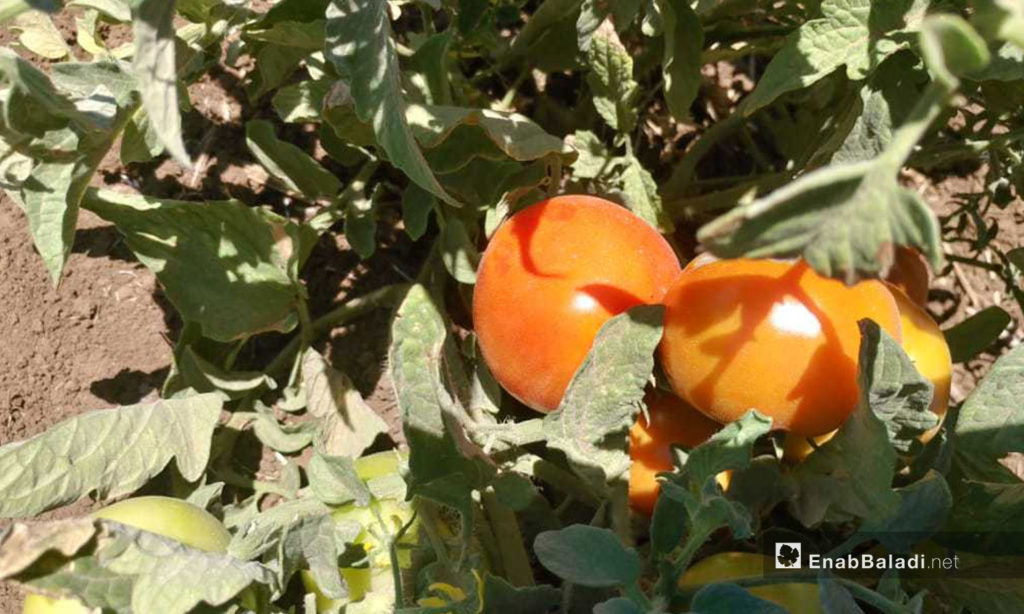Idlib countryside – Iyad Abdel Jawad
The farmers of ar-Rūj plain, west Idlib province, suffer from a shortage of water irrigation, which led to a decrease in the cultivated areas, especially the tomato growing areas.
Tomato cultivation, a strategic crop, was affected by several factors, including high cultivation costs, sales of medicines, and fertilizers in US dollars, as well as the spread of broomrape disease.
The cultivated area of tomato in ar-Rūj plain is 1,000 hectares out of the total area of the plain, which is 136,00 hectares, In the past years, it exceeded 5,000 hectares, which comprised half of the northern Syrian production of tomatoes, according to the director of the agricultural office in the village of Bani Ezz Church in ar-Rūj plain, Muhammad Darwish.
Sufficient supply of tomatoes in the market, which is controlled by US dollars
Bassam al-Muhammad, a farmer in ar-Rūj plain, had to reduce the area he used to grow with tomatoes from ten dunum (equal to one hectare) to three dunums.
Al-Muhammad explained to Enab Baladi the decrease in the area he grows with tomatoes that the prices vary between the start and end of the crop season, and traders control the costs of vegetables.
As the highest price for tomatoes at the beginning of the current season reached 750 Syrian pounds ( SYP- 0.3 USD), but now one kilo of tomatoes is 135 SYP (0.05 USD), and within a short period, the prices have decreased.
The prices of agricultural equipment and supplies, such as seeds, fertilizers, and pesticides, are linked to the value of the SYP against USD. Besides, the tomato crop is sold in SYP, which decreases the profit margin.
The farmer al-Muhammad complained about the impact of converting SYP to USD on cost and profit calculations in the short and long terms to pay the price of agricultural requirements to the sales-centers and pharmacies, noting the price of the tomato crop dropped in the peak marketing time, with the availability of different types of tomatoes imported from Turkey have caused him and other farmers significant losses.
Scarcity of water and treatment of broomrapes
The area of tomato cultivation decreased in the past few years, due to the lack of irrigation water in ar-Rūj plain and its semi-absence in the summer, especially after the decline of the role of the “Balaa” dam in the countryside of Jisr al-Shughour in storing water after 2012, which means the loss of water irrigation in summer.
The cultivation of the tomato crop was also compounded by difficulties and challenges, including the high prices of agricultural supplies such as fertilizer, fuel, pesticides and fungicide, and seeds, especially the imported hybrid ones, according to the engineer and agricultural expert Anas Abu Tarbush.
The problems of growing tomatoes did not stop here, as the plant-parasitic weeds “broomrape” has spread into the area, causing massive damage to the crop, leading to its death, according to Abu Tarbush.
On the other hand, many farmers preferred not to grow tomatoes, to avoid losses, amid the absence of mechanisms to eradicate “broomrape,” whether by mechanical or chemical control which failed to achieve the desired objectives.











